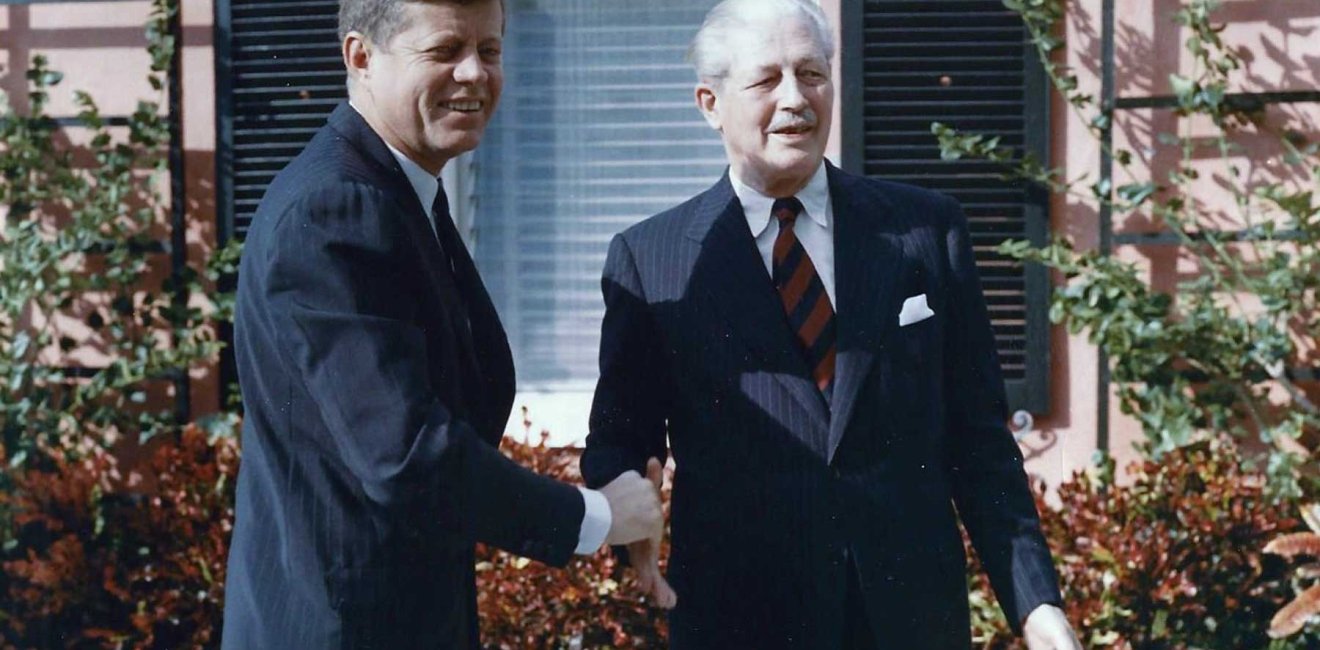This posting is part of a series of document collections co-published by the National Security Archive and the Nuclear Proliferation International History Project to mark the 50th anniversary of the Nuclear Non-Proliferation Treaty.
The 50th anniversary of the signing of the Nuclear Nonproliferation Treaty makes it worthwhile to look back at what gave the Treaty its impetus as well as the problems encountered during its negotiation. That a key issue of concern for both political figures and diplomats in both East and West was foreclosing a West German nuclear capability is no secret. How political leaders and diplomats during the 1950s and 1960s looked at the problem then is worth revisiting, not least because of the recently revived discussion of Germany’s nuclear potential. Declassified documents published for the first time by the National Security Archive illuminate the central role of the German nuclear question in U.S. policymaking about nonproliferation, or “non-dissemination” (or “non-diffusion”), as it was then called, during the early 1960s. According to President Kennedy, in a statement to Soviet Foreign Minister Andrei Gromyko: “Our particular concern regarding dissemination was Germany and one of the reasons for an MLF [Multilateral Force] was to make it less possible for the Germans to press for nuclear weapons of their own.”
Concern about German nuclear weapons potential stretched back to World War II, when Nazi Germany conducted an atomic bomb project, and forward to 1954, when Western allies ended the military occupation of Germany and brought West Germany into NATO in tandem with Chancellor Konrad Adenauer’s commitment not to produce nuclear weapons. Memories of World War II had a powerful impact and the possibility, even if remote, of an independent German nuclear force alarmed policymakers in Washington and European capitals, not to mention Moscow. Today’s posting documents continuing U.S. government unease about West German nuclear capabilities from the late 1950s into the early 1960s, when the Kennedy administration supported proposals for a non-dissemination agreement and the MLF as ways to preclude West Germany from initiating a national weapons program.
Among the documents published today are:
- The record of a 1954 meeting between Western officials and West German Nobel laureate Werner Heisenberg, a key figure in Nazi Germany’s atomic weapons project, who declared that West Germany “would not develop an atomic weapons program.”
- A top-secret message from Kennedy to British Prime Minister Harold Macmillan opposing aid to France’s nuclear weapons program because it “would signify a major reversal in our opposition to Nth country programs” and increase “the likelihood that the Germans would eventually wish to acquire a nuclear weapons capability.”, Such an outcome would “shake NATO to its foundations – not to mention the other serious dangers attendant on proliferation of nuclear weapons capabilities.”
- A July 1962 report by the U.S. Embassy in Bonn, which found that “at present there does not exist deliberate intention in Germany to embark on nuclear weapons program either alone or with French.” Nevertheless, “some German leaders have the possibility at back of their minds as possible answer to future contingencies for which no concrete anticipation now exists.”
- British Defence Minister Peter Thorneycroft’s record of his September 1962 discussions with Secretary of Defense Robert McNamara and President Kennedy, who said that if Germany began a nuclear weapons program, “the United States would have to reconsider her guarantees to station forces in Europe” and “might even have to ‘haul out.’”
- The memcon of a Kennedy-Macmillan meeting in December 1962 that has been mainly available only in the expurgated version published in the Foreign Relations of the United States, which omits some of the frank discussion, including Macmillan’s comment that Germany was “dangerous, but not as much as before the war, because the whole balance had changed and there were now two superpowers.”
- West German Defense Minister Kai-Uwe von Hassel’s assurances to Kennedy in February 1963 that West Germany would not go on any nuclear “adventures” on its own or in collaboration with the French.
- National Security Action Memorandum 241, signed by national security adviser McGeorge Bundy in May 1963, instructing the CIA and the Atomic Energy Commission to look for signs of French-German nuclear cooperation
- A Kennedy message to Macmillan encouraging British support for the MLF because “if it fails, the Germans are bound to move in much more dangerous directions; in the long run even toward some partly clandestine arrangement with the French or, if this should not work, toward an independent nuclear effort in Germany -- not now but in time.”
- A memorandum of conversation in which Soviet diplomat Georgi Kornienko argued that the MLF would expose West Germany to “the nuclear disease”: “German participation in the MLF and the physical contact with nuclear weapons which would result was a further step on the road to disaster.” A nonproliferation agreement was a better way than the MLF to solve the problem.
- A State Department Intelligence and Research report finding no evidence that West Germany and France were involved in a secret nuclear weapons program. Moreover, the French denied any cooperation with Germany concerning Pierrelatte and the West Germans had declared that they “had no intention of assisting the French in their nuclear weapons program.”
Besides World War II memories, shaping U.S. official thinking about the German nuclear question were Cold War tensions, general concern about nuclear proliferation, and the fact that other European powers, the British and the French, were developing their own weapons capabilities. European proliferation, U.S. officials worried, could encourage West German emulation. While Konrad Adenauer had made a declaration that West Germany would not produce nuclear weapons, whether his successors would abide by it remained a source of concern into the 1960s, which undoubtedly increased interest in a binding commitment, such as a nonproliferation treaty. The underlying concern was whether West Germany, much less a united Germany, would remain the responsible participant in world affairs that it was becoming after 1945.
It is worth keeping in mind that President Dwight D. Eisenhower had no objections to West German acquisition of nuclear weapons on the grounds of “one main enemy at a time.” Nevertheless, he would have found it an uphill struggle convincing the U.S.’s European allies to agree. Moreover, most U.S. officials and Eisenhower’s immediate successor, John F. Kennedy, were far from sanguine about the prospect of a nuclear Germany. Toward the end of 1962, Kennedy approved a diplomatic initiative on behalf of a nonproliferation agreement that would involve commitments by nuclear weapons states and non-nuclear weapons states. Moscow and London were both interested, but what complicated progress was a parallel effort, the Multilateral Force proposal, designed to discourage future West German interest in a weapons capability, as well as to wean London and Paris from national nuclear programs.
While Kennedy administration policymakers found the MLF useful on nonproliferation grounds, U.S. allies disliked the idea of German participation and the Soviets were alarmed by the possibility of West German exposure to the “nuclear disease.” It was these continuing disagreements that stalled progress on both the MLF and a nonproliferation agreement. Even after the MLF had died on the vine, State Department officials were reluctant to push hard for a nonproliferation agreement that excluded such an option if there was a risk that it would alienate Bonn. Thus, the path to an NPT that West Germany could support was a somewhat tortuous one, as a follow-up National Security Archive posting will confirm.
U.S. intelligence had no evidence that West Germany had nuclear weapons ambitions, much less that it had nuclear weapons R&D, but the country’s growing economy gave it a weapons potential. According to a National Intelligence Estimate,produced in June 1963, there were “no indications … that West Germany has plans for developing an independent nuclear weapons capability.” Nevertheless, intelligence analysts believed that by developing a “broadly based” civil nuclear program, Bonn was trying to “become a world leader in the nuclear sciences.” If West Germany built large power reactors and facilities to process spent fuel into plutonium, it would reach the “threshold” of a weapons capability. Thus, the possibility that West Germany could eventually be on the verge of an ability to produce weapons made it a prime target for nonproliferation diplomacy during the years ahead.
Recent debates over West Germany’s nuclear role are in stark contrast to the Cold War-era discussion. In the early 1960s, the remote possibility that someday West Germany could move in a “dangerous direction” toward an independent nuclear capability troubled Kennedy and others. The possibility that the Germans and other European countries might someday worry that the United States would leave them in the lurch in the face of aggression was a prospect that Kennedy may have seen as unlikely (although some wondered whether Washington would sacrifice New York for Paris or Hamburg in a nuclear exchange). By contrast, the tensions that have roiled trans-Atlantic relations since the 2016 election and subsequent inauguration of Donald Trump have raised questions about the durability of U.S. security guarantees to Western Europe, which in turn has generated discussions of Germany’s status as a non-nuclear weapons state. Yet, anti-nuclear sentiment abounds, with the Greens and the Social Democrats favoring withdrawal of U.S. nuclear weapons to confirm Germany’s non-nuclear status. Domestic politics and developments in the external security environment may keep nuclear weapons a contentious issue in Germany and in trans-Atlantic politics generally.
For a summary of each document, visit the National Security Archive website, here: https://nsarchive.gwu.edu/briefing-book/nuclear-vault/2018-02-02/german-nuclear-question-nonproliferation-treaty







